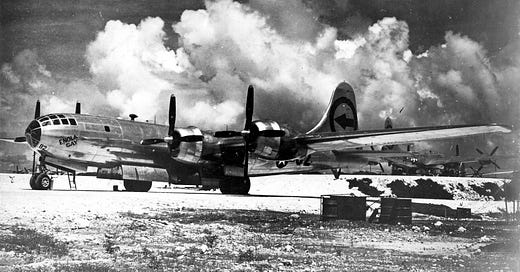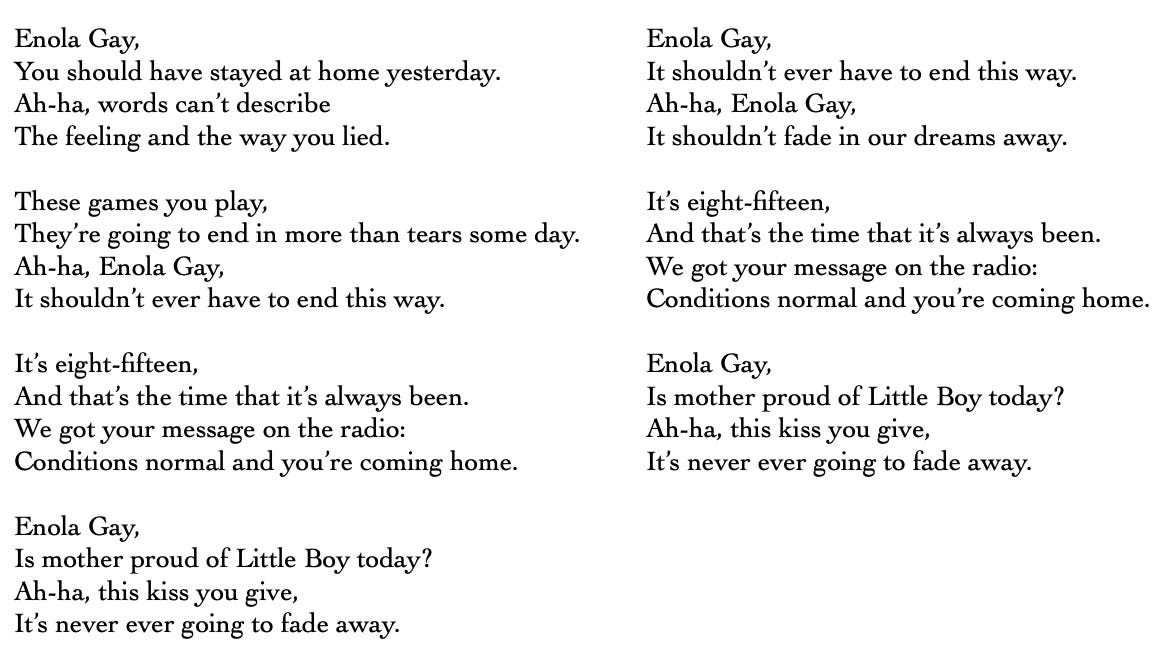The Enola Gay, pictured in 1945.1
In his short, very short, book A Short Book for Troubled Times, activist and dramatist Edward Bond has this to ask about nuclear bombs and about the airmen who bomb enemy cities.
“I wonder whose feelings people are expressing when they say they wish to retain nuclear weapons. Would they go to the victims of these weapons—the innocent children and their families, all of whom would be burned—and with their own hands burn them to death with a blow torch? Would you?—all of them? If you would not yet still say you wish to retain nuclear weapons, then you are not expressing your own feelings when you say it, even though you think you are, and call your decision democratic.”
“In war, we praise an airman for burning children to death. When he comes home and kisses his own children he is praised for being a good father. But how can he then live with his own thoughts and feelings—he must deny them. But if he does that, how could he know himself? Surely his life cannot make any sense? He has lost his humanity.”
Bond’s excursion into the hypothesis of an airman with a troubled conscience in troubled times leaves us to conjure a situation that we’re unlikely to find ourselves in. We, you and I, will never find ourselves reduced to killing the children of others, whilst cherishing our own. We know ourselves. We keep our humanity intact. Still, there are airmen who undergo precisely the moral tussle described by Edward Bond and yet still, eventually, manage to reconcile their humanity.
The navigator of the Enola Gay, which dropped the first atomic bomb on Japan towards the end of the Second World War, on 6 August 1945, was Theodore Van Kirk. He was interviewed six decades later by journalist Stephen Walker (a report to mark the 80 years since the event can be seen here). When recalling the build-up to the drop, Van Kirk says to Walker: “By this time it was a game for me. I was trying to hit that initial point exactly at nine o’clock. I’m a punctual person. When I say I’m going to pick my daughter up at five o’clock, that’s when I pick her up.”
If it is not the place of an air force operative to question the rationale, morality or anything else of his superior’s commands, whose place, then, is it? The thoughts of the airmen on that fateful day were not on the civilians going about their business down below, that much we know, nor on the legality of what was their enterprise that day. They were on the mission. Its timing. And, occasionally, their daughters.
There are two takes on Hiroshima and Nagasaki. One, that by taking 200,000 lives, the Allies saved more than 200,000 lives. My own parents, who lived through the war, defended that position in many a postprandial discussion. A hard decision, by not just the United States, but also with the consent of Canada and the United Kingdom, who, under the Quebec Agreement, needed to sign off on this exceptional case. The other take is that the bombings were frightful war crimes. But, for them actually to have been war crimes, the prerequisite was Japan winning the war, which it did not. The legality or otherwise of the means selected to ensure they did not win the war is therefore of no relevance.
For what it’s worth, my own view is that it was a frightful war crime; but mine is the luxury of not having faced the prospect of fighting a conventional war against Japan at that time. I think that that affects my view. And, perhaps rightly so. However, my view doesn’t consider the rights and wrongs of the bombing of the two cities, but the fact that it was done in a manner that was exceptional.
It was a decision undoubtedly coloured by the victory of the Allies in Europe, as a result of which there was a sense of haste, to finishing the job. When a hopeful victor chooses an exceptional means to win a war, they have to be sure it’ll work. After all, the Americans didn’t want Japanese prosecutors arraigning them before war tribunals. So, the Enola Gay had to strike a victorious blow. And if dropping nukes was not the lesson that the world took from Hiroshima and Nagasaki, it did take the lesson that selecting illegal means to win a war means you have to win it.
That has paved the way, right down to the present day, for expediency and urgency to prevail over duly considered consequences of actions. It made exceptions more regular. And worse. Because the A-bomb was such a bad exception that less-bad exceptions suddenly had a point of comparison, which just didn’t make them bad at all. Napalm, rape, corruption, unprovoked constructive declarations of war (on Iran, to take a for instance). When F. D. Roosevelt made that entry in the annals of infamy following the attack on Pearl Harbor, I hope he left plenty of blank pages for that which would ensue.
When he was interviewed by Stephen Walker, Charles Albury, who was there on 6 August as the co-pilot of the accompanying observation aircraft, The Great Artiste, said how he unofficially went to Japan with another airman just a few weeks after Hiroshima to see it close up.
“We took pictures,” said Albury. “The people didn’t look very happy, I can tell you.” In the ruins, he saw “a shadow on the wall, where somebody was probably walking by when the bomb went off.” There was no trace of the body. The thousands-of-degrees heat from the bomb had simply vaporised it. Then, in a hospital, he saw the dead and dying, “some of the people laying out on the ground outside. It was the only place I saw bodies. They were treating some of the people on the lower floors.”
He suddenly stopped. “It was devastation,” he said finally. “I can’t go back there. I don’t dwell on this too much. It’s been almost 60 years.” There was a long silence. We ended the interview there and I thanked him. But it seemed his mind was still in that hospital.
Then he said, very quietly: “Never again.”
I think you can kill a man, and it’ll trouble your conscience the rest of your life, because it will dehumanise you. But, kill 100,000 men? That you must block from all conscience. That is too great an enormity to carry with you. For, if one killing will dehumanise you, by how much more are you dehumanised by 100,000? Yet, it is possible for a man’s split senses of humanity to be reunited. It may take its time, but we now know it is possible.
Enola Gay
Written by Andy McCluskey
Performed by Orchestral Manoeuvres In The Dark
From their 1980 album Organisation
By United States Air Force - https://www.facebook.com/USairforce/photos/a.148477444988.140884.119105629988/10153561508804989/?type=1&theater, Public Domain, https://commons.wikimedia.org/w/index.php?curid=38596288






Agreed, Graham. In 1945 I was still a Canadian. I remember well the horror of August 6th. I was 12 years old. My Father's thinking (and thus mine) was that if it ended the war, it was probably necessary. However, even then, the second bombing of Nagasaki a mere three days later, was unforgivable. Years later, I took a summer class in nuclear physics, led by one of the physicists who had worked with the Oppenheimer's in New Mexico, and observed the test of the first Little Boy, in July. I learned of the rivalry between the Oppenheimer Brothers and Enrico Fermi was the real excuse for dropping both Little Boy and Fat Man. I was disgusted as well as horrified. That the rivalry between physicists could result in the needless, painful, and long term death of thousands of people at the hands of a government I, as an American had come to respect sickened me. While I admit, Harry S Truman did some fine things as President, I have lost respect for him for his racist action in approving Nagasaki. Had the atomic bomb been available in April 1945, I seriously doubt it would have been dropped on the Caucasian Germans.